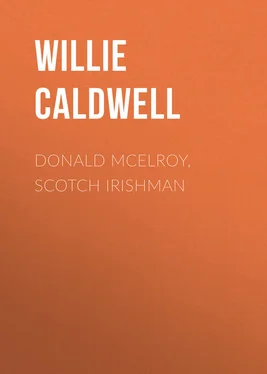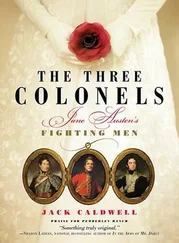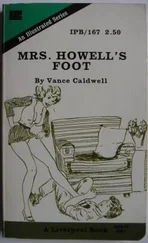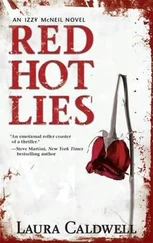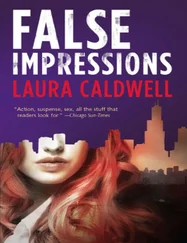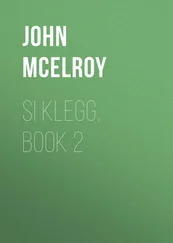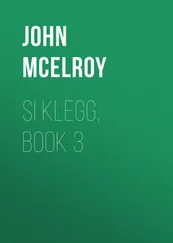Willie Caldwell - Donald McElroy, Scotch Irishman
Здесь есть возможность читать онлайн «Willie Caldwell - Donald McElroy, Scotch Irishman» — ознакомительный отрывок электронной книги совершенно бесплатно, а после прочтения отрывка купить полную версию. В некоторых случаях можно слушать аудио, скачать через торрент в формате fb2 и присутствует краткое содержание. Жанр: foreign_antique, foreign_prose, Историческая проза, на английском языке. Описание произведения, (предисловие) а так же отзывы посетителей доступны на портале библиотеки ЛибКат.
- Название:Donald McElroy, Scotch Irishman
- Автор:
- Жанр:
- Год:неизвестен
- ISBN:нет данных
- Рейтинг книги:4 / 5. Голосов: 1
-
Избранное:Добавить в избранное
- Отзывы:
-
Ваша оценка:
- 80
- 1
- 2
- 3
- 4
- 5
Donald McElroy, Scotch Irishman: краткое содержание, описание и аннотация
Предлагаем к чтению аннотацию, описание, краткое содержание или предисловие (зависит от того, что написал сам автор книги «Donald McElroy, Scotch Irishman»). Если вы не нашли необходимую информацию о книге — напишите в комментариях, мы постараемся отыскать её.
Donald McElroy, Scotch Irishman — читать онлайн ознакомительный отрывок
Ниже представлен текст книги, разбитый по страницам. Система сохранения места последней прочитанной страницы, позволяет с удобством читать онлайн бесплатно книгу «Donald McElroy, Scotch Irishman», без необходимости каждый раз заново искать на чём Вы остановились. Поставьте закладку, и сможете в любой момент перейти на страницу, на которой закончили чтение.
Интервал:
Закладка:
"The purposes o' God in His providences are inscrutable, lad; but that He maun work final good out o' this event you need nae meesdoot. Martha's a pious woman, an' her intentions are good, though without doot she is overly selfrighteous, an' has nae understanding o' the feelings o' the young. But remember, my son, 'twere better to hae o'er mooch religion than not enow, an' what e'er experience life may bring you ne'er lose reverence, lad, for the earnest and beautiful faith of your forefaithers. Because there be some who pervert its solemnity to sternness – do not conclude that Presbyterianism is a hard and narrow faith. There be some, lad, that wad make it appear so, but 'tis in their perverted minds, an' not in those lofty an' consoling doctrines which turn life into a joyful though toilsome pilgrimage to a blissful eternity."
"Should I ever be inclined to think Presbyterianism a cold, hard faith, grandmother," I answered, "I shall but need to think of you."
"Aye, laddie, think o' your old grandmaither, an' that she told you thees – that during a pilgrimage o' seventy-five years, – an' my life has known mony vicissitudes, Donald, an' mooch hardship an' danger – nae trouble e'er came to her that her religion dinna gie her strength to endure calmly, and hopefully; and nae joy that her faith dinna make the sweeter an' brighter – as being but a faint foretaste o' that perfect an' eternal happiness to which she felt assured she was journeying."
As grandmother spoke these words, there grew upon her face a rapt and absent look, and her lips parted in a smile of perfect satisfaction. I like to remember her thus – the silky bands of her white hair shining beneath her soft cap, her wrinkled hands crossed upon the finished ball, her alert brown eyes dreamy and tender, and over all her kind, bright face, that look of pure content – as of faith assured, and Heaven already realized.
CHAPTER III
Some weeks later the news came that Uncle Thomas had returned, bringing with him the "Irish lass," and a huge bundle of linens, muslins, laces, tea, spices, and other goods and delicacies such as were difficult to come by in our remote settlement. The horses were saddled as early the next morning as my mother's energetic household management permitted, and she and grandmother, who sat her horse as erectly as either of her daughters, rode across the fields to my aunt's, even more eager to inspect the contents of the bundles, which Uncle Thomas had brought, than to see our new kinswoman. I accompanied them, on foot, to lay down the fences, and to watch my grandmother's horse, lest he stumble, though I did not dare avow the last named object to the dear old lady, who liked not to be treated as if she were in any sense incapacitated by her age.
When Thomas and I entered the big room, after stabling the horses, we could see the three women in the adjoining spare room, gathered about the bed which was piled so high with "feather-ticks" that my little mother, standing, could not much more than see the top, on which was laid out an array of fine dry goods, the like of which had seldom been seen in our neighborhood.
Aunt Martha, mounted upon the bed-stool, was drawing to the edge of the bed piece after piece of her treasures, and all were talking volubly as they examined each article with eyes, fingers, tongues and even noses. I smiled as the thought came into my mind that Uncle Thomas had used the wisdom of a serpent combined with the harmlessness of a dove, according to the Bible injunction, in thus diverting Aunt Martha's worrying spirit for a while from the Irish lass thrown, so unwelcome, upon their charities. Uncle Thomas would sacrifice anything for peace in his household, though he lacked not courage where another than his wife was concerned.
"Where is our new cousin, Thomas?" I asked, as I hung my hat upon the stag antlers near the door.
"There," he said, pointing to the farthest window; then, after a moment's hesitation, he approached her and said, with shy, off-hand manner, "This is another cousin, Ellen, and his name is Donald McElroy."
The girl, who had been leaning listlessly on the window sill, turned a thin pale face towards me, and nodded silently.
"You must be very tired, Cousin Ellen," I said as kindly as I could, moved somehow with sympathy by the utter dejection of her attitude and expression.
When I spoke directly to her she looked me full in the face, and I noted the singular beauty of her eyes. They were large, almond-shaped, the bluest I have ever seen, and rayed with minute, dark lines which centered in the wide pupils. Moreover, the dark lashes, which fringed thickly their white lids, curved upward, and when they were lifted almost touched the gracefully arched black brows. Otherwise her face was not pretty; it was too long, too thin and too pale; the nose was somewhat sharp and the lips were compressed in an expression that denoted either sullenness or restrained misery, while the black hair, which had been cropped like a boy's, was stubbly and unbecoming.
"I am not tired," she answered, rather scornfully; "I'm very strong."
"But you are lonely," I said, "I wish we had brought Jean with us." Then casting about in my mind for some more available resource to offer her, I asked impulsively: "Would you like to go duck shooting this afternoon with Thomas and me? Jean goes with me sometimes."
"I would like it, but I cannot go."
"And why not?"
"My Aunt Martha says that girls should be satisfied to keep busy within doors. I am to learn to spin, and to weave, and then I'll not have time to get lonesome, she says."
"Do you not know how to spin and weave, Ellen? Why, even Jean can spin, and she's but thirteen," put in Thomas.
"My mother did not make me do the things I detested," answered Ellen with a flash of her eyes toward Thomas; then to me, with some show of interest, "Who is Jean?"
"My little sister. What do you like to do, Cousin Ellen?"
"Nothing that's useful."
"Then what sort of play do you like?"
"To shoot, to climb, to swim, to chop wood, to drive sheep and to read."
I opened my eyes wide, I suppose, for I never heard of a girl who liked such things. "And you can do these things?" I asked.
"Yes, my father taught me, and my mother said I needed outdoor life to make me strong, and at night my father would read to us, or else my mother would teach me."
"But you may like to spin; Jean does."
"No; I shall hate everything I have to do here; I would rather have died than to have come." As she said this I noticed a singular quality in her voice, though not until afterwards did I analyze it. There was a sort of tremor in certain tones, though tremor is, perhaps, too strong a word, since it was rather the suggestion of a harp-like vibration. – like the faintest echo of a sob.
"I wish I might have died when my mother did," she continued, with rising passion. "Why did God leave me alone in the world with no one to love me?" and the strange child burst into a storm of weeping, and ran out of the room, her face hidden by her arm, her slight body shaken by sobs.
"Isn't she queer, Don?" said Thomas, while Aunt Martha came from the room to inquire what was the matter, followed by my mother and grandmother.
"O, 'twas Ellen," I explained, making as light of the matter as possible; "she was answering our questions, and spoke of her mother, which started her to crying."
"Poor child!" said my mother; "I do not wonder she is unhappy, having so recently lost both her parents."
"She is by no means humbled by her afflictions, nor does she seem ever to have been taught respect and obedience," replied Aunt Martha. "Last night I stayed in her room to see that she said her prayers, and when she kneeled down she began to count the beads about her neck and to kiss the crucifix hung to them. I called her to me, and asked her if she did not know they were idolatrous symbols, that she was breaking the second commandment in using them, and that she ought to pray to the unseen God rather than to a wooden cross; and then I bade her give me the beads that I might put it out of her power to sin in that way again. But she refused to give them up, said they were the last thing her mother had kissed, and that her father had told her to say her prayers to them every day; then she grew violent and said she would part with them only with her life. I took her to her Uncle Thomas this morning, and urged him to remonstrate with her, but she again became angry and wept and stormed till Thomas bade me let the child's beads alone; since they were the gift of her dead parents, he could not see how they could do her harm, even though she did attach a superstitious importance to them. So you see, mother, that already this Irish girl is bringing trouble to my household, as I was forewarned she would. Last night was the first time I have ever heard Thomas say a word in favor of idolatry, and not for months has he spoken to me so sternly."
Читать дальшеИнтервал:
Закладка:
Похожие книги на «Donald McElroy, Scotch Irishman»
Представляем Вашему вниманию похожие книги на «Donald McElroy, Scotch Irishman» списком для выбора. Мы отобрали схожую по названию и смыслу литературу в надежде предоставить читателям больше вариантов отыскать новые, интересные, ещё непрочитанные произведения.
Обсуждение, отзывы о книге «Donald McElroy, Scotch Irishman» и просто собственные мнения читателей. Оставьте ваши комментарии, напишите, что Вы думаете о произведении, его смысле или главных героях. Укажите что конкретно понравилось, а что нет, и почему Вы так считаете.
